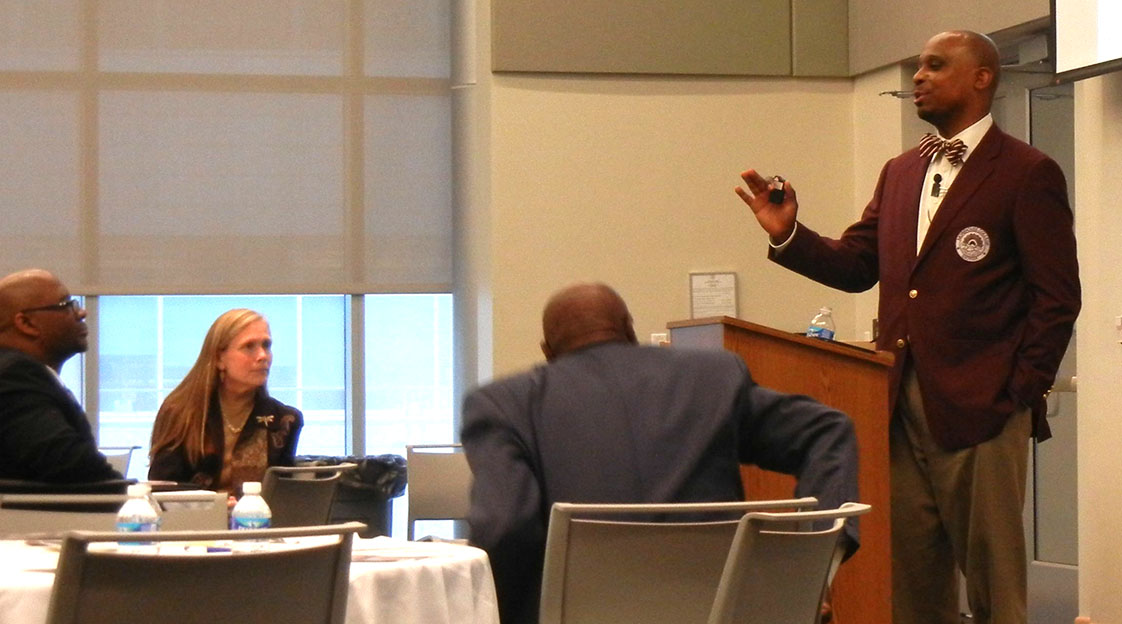In September, President Obama challenged communities to address opportunity gaps faced by boys and young men of color, and now Durham is responding.

Bryant Marks, an associate professor at Morehouse College, delivers the keynote speech at Durham’s My Brother’s Keeper Summit Nov. 13 at the Durham County Human Services Building. (Staff photo by Mark Lihn)
Obama’s initiative, My Brother’s Keeper (MBK), encourages communities to create strategies to help all young men reach their full potential in college or career paths, according its White House website. The Nov. 13 summit at the Durham Human Services Building kicked off the program in Durham.
“Boys will be boys, until someone teaches them to be more,” Michael D. Page, chairman of the Durham Board of County Commissioners, said at the summit.
Page said MBK is the ideal way for Durham to address the important issues facing young men of color. He said it is critical that Durham embraces its young men, many of whom struggle due to a lack of guidance and direction.
Page initially announced the summit March 24 in his State of the County address.
Durham Mayor Bill Bell said the initiative will be a county-wide effort.
“We have our challenges, and not the least of them is dealing with some of the issues our young men of color have,” Bell said. “Trying to find a way to put them on the right track in a positive way and keep them there. That’s not easy, but I’m convinced it can be done in any city. It can be done here in Durham.”
Heidi Carter, chairwoman of the Durham Public School Board, said 28 percent of students in Durham County public schools are African-American males. Their 72 percent graduation rate must be improved, Carter said.
She said the issue is not just an African-American issue, but an issue for the entire community because Durham needs an educated and skilled workforce.
“We need healthy citizens living in neighborhoods that are free from crime,” Carter said. “We need our children to not grow up facing the devastating impacts of poverty. We need an informed electorate to put the right people into office.”
Durham’s schools must come through on the quintessential promise of American education to provide students with social capital, social mobility and social cohesion, she said.
In order to achieve the greatest possible positive impact, Carter said Durham must take two main steps.
Students and families should be connected to the services available by placing a social worker or health and human services professional in each high poverty school, she said. Universal Pre-K, which is the number one goal of MBK, should be implemented, Carter said.
Dr. Bryant Marks, the summit’s keynote speaker, said African-American males face many educational challenges. Marks is an associate professor of psychology and director of the Morehouse Male Initiative at Morehouse College.
African-American males often face challenges regarding stereotypes and the desire to fit in, Marks said. He also pointed to the disproportionate suspensions and expulsions of African-American males and their lower level of access to a full range of math and science courses.
Suspending an African-American student is one of the worst things a school can do because they return to school embarrassed and behind in their work, Marks said.
“When we see the underperformance of our children, what we must realize is that we don’t have a child problem, we have an adult problem,” Marks said. “Kids don’t design school systems.”
He said school systems need to meet students where they are and teachers need to get to know their students personally and demographically. He said the browning of America is here, but he said that shouldn’t matter if all Americans are equal.
The browning of America refers to a demographic shift where the country will no longer be majority caucasian in the future.
“It’s extremely important that communities engage the questions with their local folks,” Marks said. “It’s one thing for the president to raise general awareness, but it’s another thing for leaders and stakeholders in their respective communities to identify specific challenges that their boys and young men of color face.”
After Marks’ speech, the summit split into three working groups with separate focuses on educational attainment, court involvement and job training and placement.
Page promised that the program would not fade away after the summit, which kicked off the effort.
Following the White House’s national guidelines, a working group will review policy and determine recommendations within 90 days of the summit, according to a pamphlet from the summit. A plan of action will then be launched with timelines and benchmarks for assessment of progress.
Kibwe G. MuDiwa says:
Greetings Mark,
As Summer approaches, I am wondering what has become of the MBK initiative in Durham?
I am a veteran of the Iraq conflict and a career soldier in the army. I am at the end of my final tour with the military, and look forward to doing good in the community.
I taught school in Durham Publics schools for 5 years, becoming Teacher of the Year in my 2nd year. I know there are several programs in the area, however, I have been struck by the President’s initiative, and the fact that my roots are in Chicago, has me seeking out programs working that initiative, specifically.
What programs in Durham are working under the, “My Brothers’ Keeper,” initiative in Durham?
Thank you,
SSG KG MuDiwa
kgmudiwa@yahoo.com